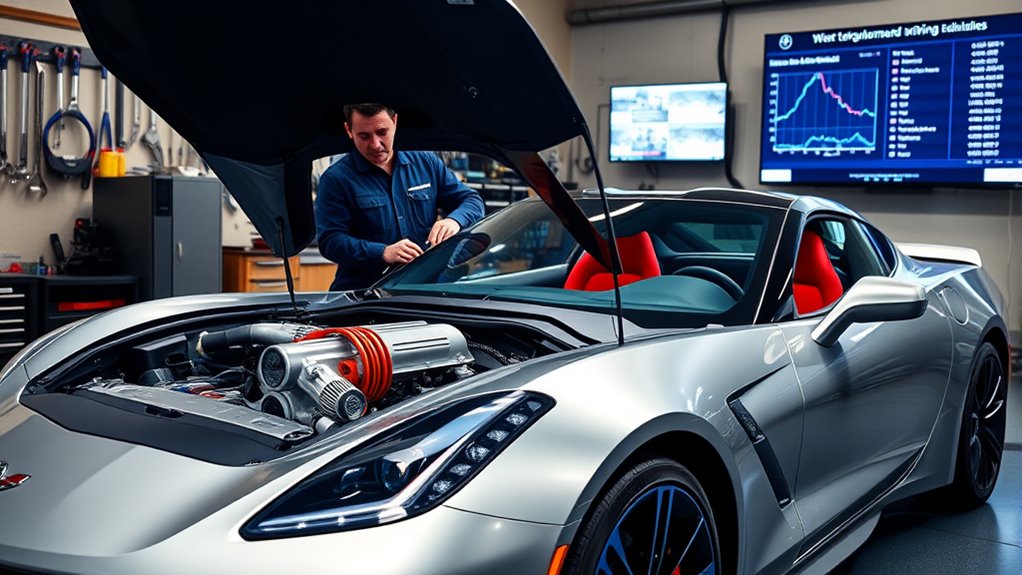As U.S. CAFE standards tighten, you need to be more aware of emissions regulations when tuning vehicles. Stricter limits mean some modifications, like high-flow exhausts or aggressive ECU tweaks, could cause compliance issues. You’ll have to focus on legal upgrades that optimize performance without exceeding emission limits. Staying informed about evolving standards helps you create smarter, responsible enhancements. If you want to learn how to balance power and compliance, keep exploring these changes.
Key Takeaways
- Stricter CAFE standards push tuners to prioritize emissions-compliant modifications over raw power gains.
- Aftermarket parts must meet evolving emissions regulations, influencing parts selection and tuning strategies.
- Advanced emissions control tech can limit traditional performance upgrades, requiring innovative, legal tuning solutions.
- Longer-term, tuners need to balance performance enhancements with regulatory compliance to avoid penalties.
- Staying informed about CAFE updates helps tuners develop environmentally responsible, high-performance vehicle modifications.

As part of ongoing efforts to reduce emissions and improve fuel efficiency, the U.S. government is tightening Corporate Average Fuel Economy (CAFE) standards. This move aims to push automakers toward producing cleaner, more efficient vehicles, which directly impacts how enthusiasts like you approach performance tuning. While the goal is to lower overall emissions, it also introduces new challenges for those customizing vehicles. Stricter emissions regulations mean that modifications affecting engine performance, exhaust systems, or fuel systems could now run afoul of compliance rules, making it trickier to push your car’s limits without risking legal issues or voiding warranties. You’ll need to stay informed about the latest standards to guarantee your tuning projects align with regulatory requirements.
These tighter standards mean that performance tuning is no longer just about boosting horsepower or torque; it’s about doing so responsibly. Manufacturers are required to meet specific fleet-wide fuel economy targets, which often leads to the implementation of advanced emissions control technologies. As a tuner, you must understand how these systems interact with aftermarket modifications. For example, installing a high-flow exhaust or a more aggressive ECU tune could alter emissions outputs, prompting compliance checks or even failing emissions tests. This increased scrutiny encourages you to adopt cleaner tuning practices, such as optimizing air-fuel ratios and ignition timing within legal limits or leveraging software solutions that maximize performance without violating emissions laws.
Responsible tuning now requires optimizing air-fuel ratios and ignition timing within legal limits to meet emissions standards.
You might also find that certain performance upgrades become more restricted or require certification to remain compliant. Some aftermarket parts may need to be designed with emissions standards in mind, making the selection process more deliberate. You’ll need to work closely with suppliers who understand the evolving regulatory landscape to take into account your modifications won’t cause your vehicle to become non-compliant. It’s also wise to weigh the long-term implications—strict CAFE standards could lead to the development of more sophisticated emissions controls, which might limit the potential of traditional performance upgrades. Staying ahead means researching and adopting tuning strategies that enhance performance while adhering to the new regulations.
In essence, these tightened CAFE standards challenge you to balance the desire for power with the responsibility of emissions compliance. Performance tuning isn’t just about making your vehicle faster anymore; it’s about doing so within a framework that respects environmental regulations. By staying informed and adjusting your approach, you can continue to enjoy customizing your vehicle without risking regulatory penalties. This evolving landscape pushes you to innovate smarter, combining performance enhancements with the latest emissions-compliant technologies, ensuring your passion for tuning aligns with the government’s environmental goals. Additionally, understanding the latest standards can help you avoid costly mistakes and stay compliant with evolving regulations.
Frequently Asked Questions
How Will CAFE Changes Affect Aftermarket Performance Parts?
You’ll find that tighter emissions regulations from the CAFE standards may limit the use of certain aftermarket performance parts. Manufacturers could restrict compatibility to meet new emissions rules, making some upgrades less effective or harder to install. You’ll need to stay informed about aftermarket compatibility and choose parts that comply with evolving regulations to guarantee your vehicle remains both high-performing and legal on the road.
Are There Any Exemptions for Certain Vehicle Categories?
About 50% of vehicles on the road fall under specific exemptions. Vehicle exemptions and category carve outs are available for certain classes, like work trucks or specialty vehicles, which aren’t subject to the same standards. These carve outs help manufacturers maintain flexibility, but as standards tighten, you might find fewer exemptions for newer or more common vehicle categories, affecting how you modify or upgrade your vehicle.
Will Tuning Software Become More Restricted Under New Standards?
You’ll likely see stricter restrictions on tuning software as emissions regulations tighten, making it harder to modify engine parameters legally. Manufacturers may also impose warranty implications if you alter the software, especially if emissions-related issues arise. These new standards aim to reduce emissions, which could mean tighter controls and fewer opportunities for aftermarket tuning. Stay informed about legal limits and warranty risks to avoid penalties or voided coverage.
How Might CAFE Tightening Impact Used Car Values?
As CAFE standards tighten, used car values may decline if models can’t meet new fuel economy targets. You might notice lower resale values for less efficient vehicles, as buyers prioritize fuel economy for savings and compliance. To maximize your car’s worth, consider upgrading or choosing models with better fuel efficiency, ensuring they meet future standards. This shift emphasizes the importance of fuel economy in maintaining resale value in a changing automotive landscape.
What Are the Long-Term Environmental Benefits of Stricter Standards?
Imagine a future where cars consistently achieve higher fuel efficiency and emit fewer pollutants. Stricter standards drive automakers to innovate, leading to significant emission reductions and cleaner air. Over time, these policies help combat climate change by lowering greenhouse gases. As a result, communities experience healthier environments, and you enjoy a future with improved air quality and sustainable transportation options, making your daily drive more eco-friendly and beneficial for the planet.
Conclusion
As a tuner, tightening U.S. CAFE standards mean you’ll need to focus more on fuel efficiency without sacrificing performance. For example, imagine upgrading a car’s intake and tuning the ECU to boost MPG while maintaining power. Staying ahead of these regulations can give you a competitive edge and help your clients meet future standards effortlessly. Embrace innovation now, and you’ll be well-prepared for the evolving automotive landscape.









